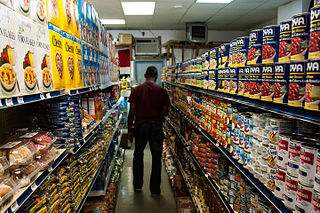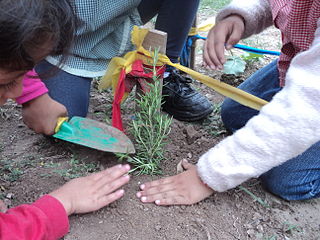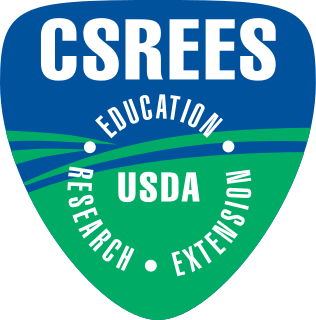
4-H is a U.S.-based network of youth organizations whose mission is "engaging youth to reach their fullest potential while advancing the field of youth development". Its name is a reference to the occurrence of the initial letter H four times in the organization's original motto "head, heart, hands, and health" which was later incorporated into the fuller pledge officially adopted in 1927. In the United States, the organization is administered by the National Institute of Food and Agriculture of the United States Department of Agriculture (USDA). 4-H Canada is an independent non-profit organization overseeing the operation of branches throughout Canada. There are 4-H organizations in over 50 countries; the organization and administration varies from country to country.

In the United States, the Supplemental Nutrition Assistance Program (SNAP), formerly known as the Food Stamp Program, is a federal program that provides food-purchasing assistance for low- and no-income people. It is a federal aid program, administered by the United States Department of Agriculture under the Food and Nutrition Service (FNS), though benefits are distributed by specific departments of U.S. states.

Helen Keller International combats the causes and consequences of blindness and malnutrition by establishing programs based on evidence and research in vision, health and nutrition. Founded in 1915 by Helen Keller and George A. Kessler, the organization's mission is to save the sight and lives of the most vulnerable and disadvantaged.
The basic needs approach is one of the major approaches to the measurement of absolute poverty in developing countries. It attempts to define the absolute minimum resources necessary for long-term physical well-being, usually in terms of consumption goods. The poverty line is then defined as the amount of income required to satisfy those needs. The "basic needs" approach was introduced by the International Labour Organization's World Employment Conference in 1976. "Perhaps the high point of the WEP was the World Employment Conference of 1976, which proposed the satisfaction of basic human needs as the overriding objective of national and international development policy. The basic needs approach to development was endorsed by governments and workers' and employers' organizations from all over the world. It influenced the programmes and policies of major multilateral and bilateral development agencies, and was the precursor to the human development approach."
The Child Nutrition Act of 1966 (CNA) is a United States federal law (act) signed on October 11, 1966 by President Lyndon B. Johnson. The Act was created as a result of the "years of cumulative successful experience under the National School Lunch Program (NSLP) to help meet the nutritional needs of children." The National School Lunch Program feeds 30.5 million children per day. NSLP was operated in over 101,000 public and nonprofit private schools in 2007. The Special Milk Program, functioning since 1954, was extended to June 30, 1970 and incorporated into the act. The act also provided Federal funding assistance towards non-food purchases for school equipment.
The Special Supplemental Nutrition Program for Women, Infants, and Children (WIC) is a federal assistance program of the Food and Nutrition Service (FNS) of the United States Department of Agriculture (USDA) for healthcare and nutrition of low-income pregnant women, breastfeeding women, and children under the age of five. Their mission is to be a partner with other services that are key to childhood and family well-being. The basic eligibility requirement is a family income below 185% of the federal poverty level. Most states allow automatic income eligibility, where a person or family participating in certain benefits programs, such as the Supplemental Nutrition Assistance Program, Medicaid, or Temporary Assistance for Needy Families, may automatically meet the income eligibility requirements. Currently, WIC serves 53 percent of all infants born in the United States.

Food policy is the area of public policy concerning how food is produced, processed, distributed, purchased, or provided. Food policies are designed to influence the operation of the food and agriculture system balanced with ensuring human health needs. This often includes decision-making around production and processing techniques, marketing, availability, utilization and consumption of food, in the interest of meeting or furthering social objectives. Food policy can be promulgated on any level, from local to global, and by a government agency, business, or organization. Food policymakers engage in activities such as regulation of food-related industries, establishing eligibility standards for food assistance programs for the poor, ensuring safety of the food supply, food labeling, and even the qualifications of a product to be considered organic.

A food desert is an area that has limited access to affordable and nutritious food, in contrast with an area with higher access to supermarkets or vegetable shops with fresh foods, which is called a food oasis. The designation considers the type and quality of food available to the population, in addition to the accessibility of the food through the size and proximity of the food stores.

Garden-based learning (GBL) encompasses programs, activities and projects in which the garden is the foundation for integrated learning, in and across disciplines, through active, engaging, real-world experiences that have personal meaning for children, youth, adults and communities in an informal outside learning setting. Garden-based learning is an instructional strategy that utilizes the garden as a teaching tool.
Dairy Council of California provides free nutrition education programs to California children and adults through teachers and health professionals. In addition, the Dairy Council of California provides a Mobile Dairy Classroom, a free outdoor assembly with a live cow. The organization also provides consumers with nutrition information through a website, HealthyEating.org.
The Food Distribution Program on Indian Reservations (FDPIR) allows Indian Tribal Organizations (ITOs) to operate a food distribution program as an alternative to the Food Stamp Program for those living on or near an Indian reservation. The Food and Nutrition Service (FNS), an agency of the U.S. Department of Agriculture, administers FDPIR at the Federal level, and is locally operated through ITOs or State agencies(SAs). Eligibility for benefits is similar to the food stamp (SNAP) program, and funds are drawn from food stamp appropriations. Food Distribution Program Nutrition Education (FDPNR) grants are also awarded to participating FDPIR ITOs. These grants are awarded to support nutrition education activities that are culturally relevant, promoting healthy food choices, and promoting physical activity among participants.
HealthCorps is an American nonprofit organization that provides school-based and organizational health education and peer mentoring in addition to community outreach to underserved populations. Its mission is to strengthen communities by highlighting innovative approaches to health and wellness to build resilience in America's youth. Students learn life-saving skills in nutrition, fitness and mental resilience as well as hands-on CPR training, organ donation and more.
Gardens for Health International (GHI) is an American 501(c)(3) non-profit organization that seeks to provide sustainable agricultural solutions to chronic childhood malnutrition. GHI partners with rural health centers in Rwanda to equip families with the seeds, skills, and support necessary to shift the paradigm of food aid from dependency to prevention and self-sufficiency.

Girls on the Run, a national non-profit organization, designs programming that strengthens third- to eighth grade girls’ social, emotional, physical and behavioral skills to successfully navigate life experiences. The program’s intentional curriculum places an emphasis on developing competence, confidence, connection, character, caring, and contribution in young girls through lessons that incorporate running and other physical activities. The life skills curriculum is delivered by caring and competent coaches who are trained to teach lessons as intended.

The Nutrition Foundation of the Philippines, Inc. (NFP) is a Philippine private, non-stock, non-profit organization dedicated to promoting good nutrition in Filipino communities. The NFP was founded by National Scientist, Dr. Juan Salcedo Jr.
Nutrition education is a set of learning experiences designed to assist in healthy eating choices and other nutrition-related behavior. It includes any combination of educational strategies, accompanied by environmental supports, designed to facilitate voluntary adoption of food choices and other food and nutrition-related behaviors conducive to health and well-being. Nutrition education is delivered through multiple venues and involves activities at the individual, community, and policy levels. Nutrition Education also critically looks at issues such as food security, food literacy, and food sustainability.
School meal programs in the United States provide school meals free of charge, or at a government-subsidized price, to U.S. students from low-income families. These free or subsidized meals have the potential to increase household food security, which can improve children's health and expand their educational opportunities. A study of a free school meal program in the United States found that providing free meals to elementary and middle school children in areas characterized by high food insecurity led to increased school discipline among the students.

The Summer Food Service Program (SFSP) began in 1968. It was an amendment to the National School Lunch Act. Today, the SFSP is the largest federal resource available for local sponsors who want to combine a child nutrition program with a summer activity program. Sponsors can be public or private groups, such as non-profit organizations, government entities, churches, universities, and camps. The government reimburses sponsors for the food at a set rate. There are still communities that have not created a Summer Food Service Program in their community. For those individuals that want to help ensure children have meals during the summer, they can get more information from the USDA or their state government agencies.

The Cooperative State Research, Education, and Extension Service (CSREES) was an extension agency within the U.S. Department of Agriculture (USDA), part of the executive branch of the federal government. The 1994 Department Reorganization Act, passed by Congress, created CSREES by combining the former Cooperative State Research Service and the Extension Service into a single agency.









